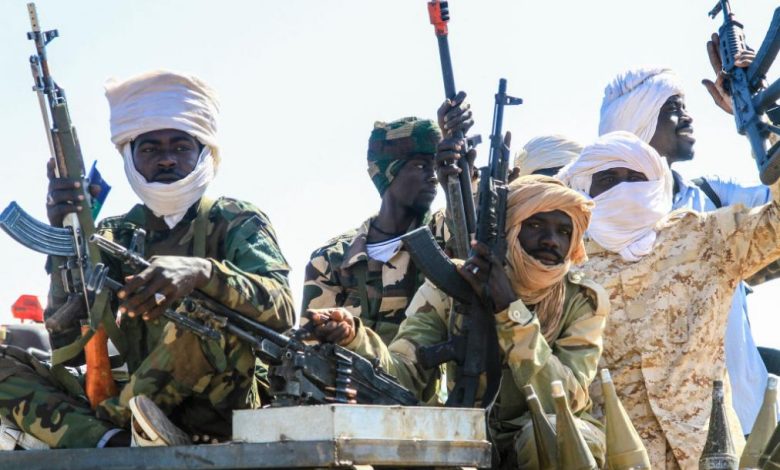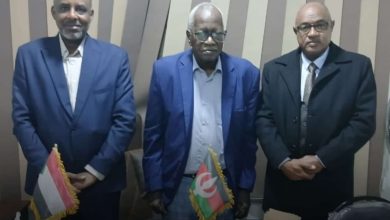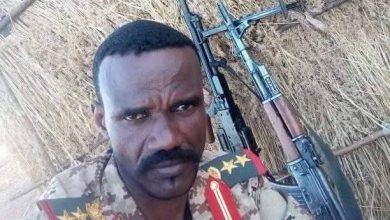El Fasher.. Fears of Bloody Fighting

Agencies
International voices are growing louder warning of an expected “attack” on the city of El Fasher in the Darfur region of Sudan, which has been witnessing war for more than a year. The US State Department, through its spokesman, Matthew Miller, called in a statement for an immediate halt to the attacks on El Fasher in North Darfur. He added that Washington is “very concerned about reliable reports of the Rapid Support Forces (RSF) and its affiliated militias destroying several villages west of El Fasher, while the Secretary-General of the United Nations, António Guterres, expressed in statements his concern about a possible imminent attack on El Fasher.”
Displacement and famine
Within one year, the war in Sudan led to thousands of deaths, including up to 15,000 people in El Geneina, the capital of West Darfur state, according to United Nations experts.
The war also pushed the country, with a population of 48 million, to the brink of famine, destroyed the already dilapidated infrastructure, and displaced more than 8.5 million people, according to the United Nations.
El Fasher is a humanitarian center for the Darfur region, where about a quarter of Sudan’s 48 million people live. Although it hosted many displaced people, the city remained relatively untouched by the fighting, according to Agence France-Presse.
The Darfur region was already exposed to destruction about 20 years ago. Due to the scorched landl policy pursued by the “Janjaweed” militias, whose members were integrated into the RSF during the era of former President Omar Al-Bashir.
El Fasher is the only capital of the five states of Darfur that is not controlled by the RSF. It was devastated by a civil war that claimed hundreds of thousands of victims and which began in 2003.
El Fasher’s population includes an estimated half a million people who were displaced during this previous conflict, and about half a million additional people were displaced to the city during the war that broke out a year ago.
The armed movements that signed the historic peace agreement concluded in 2020 in Juba with the transitional civilian government that took power following the overthrow of former President Omar Al-Bashir are based in El Fasher.
As a result of the deteriorating situation in the capital of North Darfur state, the armed movements that signed the Juba Agreement announced in a statement in mid-April that “there is no longer neutrality,” stressing that they “will fight with their allies, patriots, and armed forces against the RSF militias and their hired helpers.”
Residents, aid agencies and analysts told Reuters that the fight for control of El Fasher, a historic center of power, could be prolonged, and inflame the ethnic tensions that emerged in the conflict in the early 2000s in the region, which extends across Sudan’s border with Chad.
Why is the militia targeting El Fasher?
Since the beginning of April, there have been reports of explosions and clashes in the villages surrounding El Fasher.
The RSF militia, led by Mohammad Hamdan Dagalo, known as “Hemedti,” currently controls four of the capitals of the five states of Darfur, except for El Fasher, which includes armed groups that had pledged until recently to stand at the same distance from both sides of the war. This prevented it from sliding into fighting, according to Agence France-Presse.
But this position changed weeks ago with armed movements announcing that they had decided to fight against the RSF . Because of the “provocations and violations” these forces are accused of committing in El Fasher.
Since the beginning of April, North Darfur state has witnessed clashes on two fronts: the first between the RSF and the armed movements west of El Fasher, and in the city of Melit, which is located 100 kilometers north of it, and the second between the RSF militia and the army in El Fasher.
The El Fasher clashes led to escalation of international concern over the fate of the city, which was a major center for the distribution of relief and aid.
Guterres said on April 10, “A few days ago, militias affiliated with the RSF attacked and burned villages west of the city, leading to a new large-scale displacement and fears of controlling the only water source near El Fasher,” a city inhabited by hundreds of thousands of residents.
He continued, “Let me say clearly: any attack on El Fasher would be devastating for civilians, and could lead to comprehensive societal conflict throughout Darfur. It would also turn relief operations upside down in a region that is already on the brink of famine.”
In mid-April, the El Fasher Resistance Committees, which are informal volunteer groups, accused the RSF Militia of “burning six villages in the west of the city.”
Two movements, the Sudan Liberation Army, led by Minni Minawi, and the Justice and Equality Movement, led by Jibril Ibrahim, said they would also confront the RSF
Clashes and fighting
Analysts say that clashes have erupted for a long time between Arab and non-Arab tribes such as the Zaghawa over valuable lands and resources in Darfur.
A spokesman for the Revolutionary Awakening Council confirmed a video recording of Hilal addressing forces in North Darfur a few days ago, but said it was too early to say whether the forces would join the fighting in El Fasher or elsewhere.
“Even if there is a ceasefire between the Sudanese Armed Forces and the RSF, the matter is more than that,” Jonas Horner, an independent Sudanese analyst, told Reuters. There are scores being settled and tensions being renewed.”
Since the beginning of the month, at least 11 villages on the outskirts of El Fasher have been destroyed, according to satellite images obtained by the Yale University Humanitarian Research Laboratory. United Nations estimates indicate that at least 36,000 people have been displaced.
Senior United Nations officials warned the UN Security Council last Friday that about 800,000 people in the Sudanese city of El Fasher are exposed to “severe and immediate danger.”
“The fighting in El Fasher could unleash a bloody tribal conflict across Darfur,” Rosemary DiCarlo, the UN’s political affairs chief, told the 15-member Security Council.
RSF and Sanctions
A few days ago, a group of US senators called for direct sanctions to be imposed on the RSF and its leader, Hemedti.
In a letter in which they called on US President Joe Biden to impose sanctions on the RSF under the Magnitsky Act, the lawmakers noted that Hemedti “committed violations deserving of sanctions,” referring to accusations that these forces committed mass rapes, kidnappings, human rights violations, and carried out politically assassinations, according to a report published by Foreign Policy magazine.
Lawmakers gave the Biden administration 120 days to determine whether or not to impose sanctions on the RSF .
Last September, Washington announced the imposition of sanctions on the deputy commander of the Sudanese RSF , Abdul Rahim Dagalo, for his leadership role in the forces that participated in “acts of violence and human rights violations.”
Abdul Rahim is the brother of the commander of the RSF, Mohamed Hamdan Dagalo, known as “Hemedti,” and he was included in the US sanctions list “pursuant to Executive Order No. 14098 because he was a commander, official, senior executive, or member of the leadership of the RSF, in which he participated.” Its members engage in actions or policies that threaten peace, security or stability in Sudan.”
The ministry said in a statement at the time that those forces participated in “a massacre against civilians, ethnic killing, and the use of sexual violence.”
Food crisis
Awadallah Hamed, director of Practical Action in Darfur, speaking to Reuters from the city, which has only a small number of international humanitarian workers, said that El Fasher itself has no longer had running water or working electricity lines for a year.
He added that only one public hospital is functioning, while displaced people are crowding schools and public buildings.
Jerome Tubiana, a Darfur expert and advisor to the charity Doctors Without Borders, told Reuters that the all-out fighting “already threatens to complicate humanitarian access, at a time when available data shows that El Fasher is suffering from a very serious food crisis.”
Since the war began, only small amounts of aid have entered El Fasher, the only channel approved by the military for shipments to other parts of Darfur. Residents say that although markets are functioning, the RSF’s control of the main road has caused prices for fuel, water and other goods to rise.



